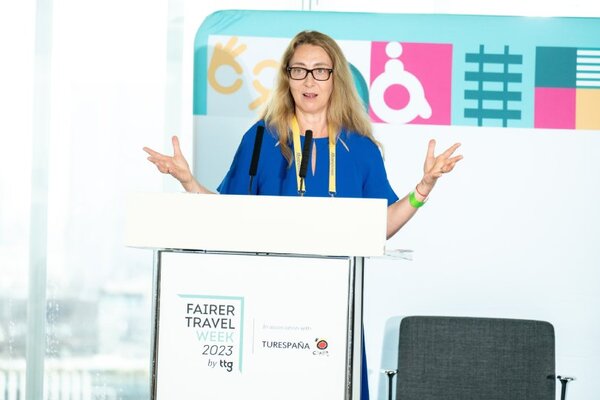'More top Atol holders must make firm commitments on sustainability'
Is it time more of the UK’s biggest travel companies made firm commitments on sustainability? Patrick Richards from the ITT Sustainability Committee’s partner TerraVerde Sustainability runs the rule for TTG.
Less than a third (30%) of the UK’s biggest travel companies have proactively and publicly published comprehensive sustainability plans, new research carried out in partnership with the ITT’s Sustainability Committee has revealed.
We at TerraVerde Sustainability analysed the websites of the UK’s top 50 Atol holders for evidence of their sustainability commitments and strategies, while also evaluating their efforts to promote sustainable travel choice.
The findings revealed:
- More than 40% failed to mention sustainability in any capacity;
- Only 30% had shared credible sustainability strategies on their sites;
- Only 14% had set science-based targets aligned with the Science-Based Targest initiative’s Corporate Net-Zero Standard; and
- Just three had signed the UNWTO-backed Glasgow Declaration for Action in Tourism.
Tourism is currently responsible for between 8-11% of global carbon emissions. With the World Travel and Tourism Council (WTTC) forecasting the sector being likely to grow in GDP terms by nearly two-thirds (64%) over the next 10 years, there is dramatic potential for further increases.
Managing this growth while minimising environmental impact poses a significant challenge for the industry. The largest companies in our sector – those with the greatest influence and the most extensive supply chains – should surely therefore take the lead.
While the likes of Jet2 plc, Tui, easyJet, Booking.com and Expedia should be commended for their efforts, these giants typically have the greatest resources to hand – and there is evidence to suggest being part of the transition to responsible tourism needn’t be resource dependant.
A number of smaller travel companies are showing up their larger industry counterparts by embracing sustainability and evidencing their efforts by pursuing standards like B Corp Certification. Moreover, businesses further down the top 50 such as Audley Travel or Midcounties Co-op, who have made the Glasgow Declaration, are also showing what can be achieved.
To those top 50 businesses yet to act, we put out the call to participate in the essential collaboration needed to reduce our impact and ensure this vital transition is no longer a specialised niche but the norm.
So what’s holding large businesses back? Let’s explore some of the factors we believe are impacting progress and put forward some ideas to dismantle the barriers preventing it.
Concerns over cost
The cost of living crisis has to some extent dampened the much-anticipated post-pandemic rebound for travel. Plus, managers have historically prioritised short-term profit and growth over environmental concerns, with many of the belief implementing sustainability strategies will be costly and time-consuming.
However, while it often requires some initial investment, businesses incorporating green practices typically improve operational efficiency, reduce costs and increase staff retention, not to mention bolster their brand’s reputation.
Progressive travel companies are quick to recognise that failing to embrace sustainable practices can threaten the long-term viability of their businesses. A thought echoed by Fiona Jeffery OBE, founder of the Just a Drop charity.
“Travel businesses should be more than just good at business, they should seek to drive and affect change by taking direct responsibility for doing the right thing," said Jeffery. "Unless we protect the very product we promote, we’ll destroy both our own business model and the environment.”
Winning hearts and minds
Embedding sustainable initiatives requires organisations to place sustainability at the heart of their purpose, but most employees lack a thorough understanding of the terminology, issues and frameworks, making it difficult for companies to live up to their ambitions. Couple this with a resistance to change which often accompanies any cultural transformation and it can be difficult for businesses to gain the traction they need.
However, a relatively minor investment in upskilling staff can ensure your team is equipped with the tools and confidence they need to accelerate progress. For example, the wide variety of cost-effective “carbon literacy” workshops that are now on the market.
Fear of ‘getting it wrong’
Sustainable initiatives hold the power to inspire, change mindsets and encourage collaboration that accelerate change. Yet, fear of "getting it wrong" often leads brands to refrain from publicising their achievements.
This phenomenon, often termed "greenhushing", can be as detrimental to progress as greenwashing, whereby brands create a false impression of greater environmental commitments than they genuinely possess.
If fear is holding you back, TTG Media owner and CEO Daniel Pearce has some advice: "Finding your 'why' is crucial for authentic communication.
"As a media organisation, not a supplier of travel, TTG Media’s contribution to the travel and tourism sector’s carbon footprint is relatively small. But our ability to influence and unify the industry community into taking action on climate change is considerable, such as through TTG Fairer Travel Month or our TTG Sustainable Travel Heroes initiative.
"Discovering your own purpose can sharpen your focus and ensure that you remain relevant as a business in the future."
Waiting for it to become a legal requirement
To date, many organisations have not considered sustainability a priority as there was no legal requirement to report on their environmental impact. With the introduction and planned expansion of the EU-led Corporate Sustainability Reporting Directive (CSRD), this is set to change.
Currently, EU businesses turning over more than €40 million a year must submit non-financial (sustainability) reports alongside their financial accounts. By 2030, every business will be within the scope of the CSRD, including SMEs, and fines for non-compliance will be up to 5% of global turnover.
While the CSRD is an EU-led initiative, similar legislation is currently being planned within the UK, the US and some Asian nations, reflecting a global recognition of the importance of corporate social responsibility and transparency in addressing environmental impact.
Compliance with CSRD requires a solid understanding of its requirements and a detailed internal assessment, supported by accurate and transparent data and robust data management systems. Forward-thinking businesses will view it as a strategic opportunity to adopt the right tools and seek necessary guidance now to maintain a competitive edge and stay ahead of the evolving requirements.
Why does it all matter?
It's crucial for the future of the travel industry – and our planet – that we reduce the environmental impact of tourism; as pressure grows from customers, governments, and investors, the spotlight on companies - particularly the largest - will intensify.
If your travel business hasn't yet begun its journey towards sustainability, take a moment to consider what’s holding you back. Identifying and addressing these challenges promptly is crucial, and the TerraVerde team can help you quickly recognise roadblocks and construct a practical pathway towards a greener future.
Next steps and more information
For more information on ITT’s sustainability programme, visit itt.co.uk
For more information on TerraVerde Sustainability, visit terraverde-solutions.com
The evaluation of the UK's top 50 Atol holders' websites was based on the following criteria:
- First, the presence or absence of sustainability discourse on the company's website;
- Second, the publication of formal sustainability documents and plans;
- Third, the comprehensiveness of these documents (documents were considered comprehensive if actionable steps were roadmapped); and
- Fourth, which plans aligned with science-based targets and the GHG Protocol Corporate
Be inspired to take the next steps in your sustainability journey
Join us for a full day packed with practical advice and honest case studies, designed to help you make a real difference to your business’s sustainability strategy and create a fairer industry for customers, staff and the destinations you operate in.
Sign up for weekday travel news and analysis straight to your inbox

Patrick Richards
Supplier Directory
Find contacts for 260+ travel suppliers. Type name, company or destination.

















